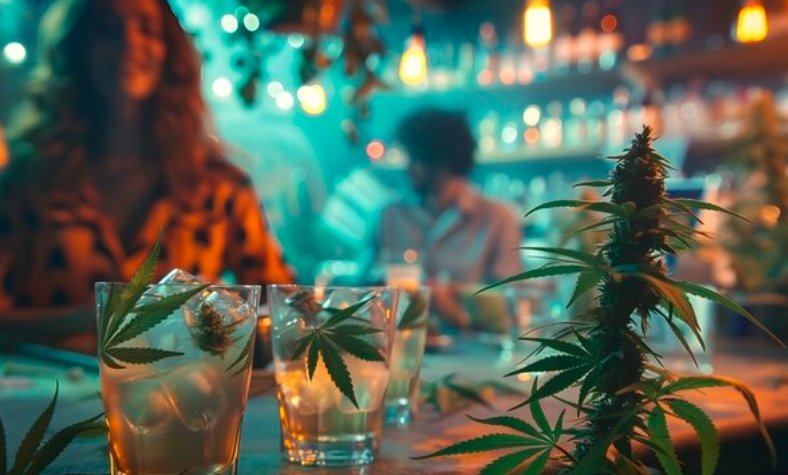A recent study in Drug and Alcohol Dependence has shed light on how cannabis and alcohol use affect couples’ relationship satisfaction. The study, which monitored couples’ daily substance use and relationship quality over two weeks, found that heavy cannabis users reported lower relationship satisfaction when using both cannabis and alcohol. Interestingly, alcohol alone was linked to a slight increase in next-day satisfaction for these individuals. For lighter cannabis users, substance use appeared to have no significant impact on their relationship dynamics.
The Study: Exploring Substance Use and Relationship Dynamics
Researchers from the University of Colorado Boulder conducted the study using a “dyadic diary” method. This approach required both partners in a relationship to keep daily records of their cannabis and alcohol use, alongside a five-point rating of their relationship satisfaction. This data collection allowed for day-to-day observations of how substance use patterns influenced relationship quality.
- Participants: 33 couples, primarily heterosexual, aged 30-40, and in long-term relationships.
- Duration: 14 days of daily tracking and self-reporting.
- Measures: Frequency of cannabis and alcohol use, relationship satisfaction, and demographic and mental health indicators.

Key Findings: Cannabis, Alcohol, and Relationship Quality
The study found distinct patterns based on the frequency and type of substance use:
- Heavy Cannabis Users: Among individuals who reported heavy cannabis use, a combination of cannabis and alcohol led to decreased relationship satisfaction the following day. However, alcohol alone tended to improve their satisfaction.
- Light Cannabis Users: For those who used cannabis infrequently, neither cannabis nor combined use of cannabis and alcohol showed a significant effect on their relationship satisfaction.
The findings indicate that not only does substance use influence relationship quality, but the combination of substances—especially for heavy cannabis users—can have unique effects on relationship satisfaction. Lead author Margy Yumeng Chen noted, “Substance use within couples isn’t just about personal choices; it affects daily relationship dynamics as well.”
Concordant vs. Discordant Usage Patterns
The study categorized couples as “concordant” or “discordant” based on their cannabis use habits:
- Concordant Couples: Both partners used cannabis simultaneously or neither used it.
- Discordant Couples: Only one partner used cannabis, or the partners used cannabis on different days.
Most participants fell into the “discordant” category, meaning one partner typically used cannabis more frequently than the other. This difference in usage patterns highlighted how daily choices can influence the nuances of relationship satisfaction. Concordant couples, who shared similar substance use behaviors, were less frequently represented in the study, which limited the researchers’ ability to compare the impact of shared versus individual use.
Alcohol Alone as a Positive Factor
For individuals using cannabis heavily, alcohol-only use was associated with increased relationship satisfaction the next day. This effect may point to alcohol’s stress-relieving and social-enhancing properties. However, when combined with cannabis, it led to the opposite effect. Previous studies have noted that combining substances often intensifies their negative effects, which may help explain this pattern.
Differences by Intensity of Cannabis Use
The intensity of cannabis use emerged as a crucial factor in determining its impact on relationships. Heavy cannabis use, particularly when paired with alcohol, had a more pronounced effect on relationship satisfaction, while lighter use appeared neutral.
This distinction underscores the importance of considering not just the substance itself but also the level of use and personal habits within each relationship. For couples in which one partner is a heavy user and the other is not, the findings suggest a potential source of discord, especially when mixed with alcohol.
Implications and Future Directions
This study highlights the nuanced impact of substance use on relationships, particularly where both partners have different usage patterns. Given the growing normalization of cannabis use, understanding its impact on interpersonal relationships has become more relevant. According to Chen, “The way partners interact with alcohol and cannabis isn’t just a personal experience; it has real, measurable effects on relationship quality.”
Chen plans to explore additional factors in future research, such as the specific motives behind substance use, including stress relief or intimacy enhancement. Understanding these underlying motivations could offer insights into how couples can navigate substance use without negatively impacting their relationship.
Limitations and Considerations
While the study provides valuable insights, it also has some limitations:
- Sample Diversity: The sample was relatively homogeneous, primarily consisting of white, long-term couples aged 30 to 40. This limits the generalizability of the findings to other demographics, such as younger couples, those in casual relationships, or individuals from more diverse backgrounds.
- Focus on Short-Term Effects: The study tracked daily relationship satisfaction but did not examine long-term relationship outcomes. Daily fluctuations provide insight into short-term impacts, but further research is needed to understand how these dynamics evolve over time.



